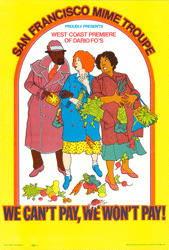1979: We Can't Pay, We Won't Pay (Dario Fo)
| Writen by Dario Fo Text based on the British translation by Lino Pertile, adapted by Bill Colvill & Robert Walker, and American translations by People's Translation Service & the SFMT, adapted by the SFMT Directed by the SFMT WE CAN'T PAY featured |
 Poster Design: Dina Redman |
We Can't Pay, We Won't Pay is set in an economically depressed working class neighborhood in Italy where food prices are skyrocketing. People are resorting to eating "rabbit heads", "Millet for Birds", and succulent "Supermeat Dog Food" instead of their usual gastronomical fare. The very funny physical farce gets rolling when Antonia tries to hide the fact that she smuggled food out of a supermarket during a food riot from her husband Giovanni, who would rather "starve than eat stolen food." In the ensuing complications, which include the appearance of a buffoonish police detective hot on the trail of "food thieves," Antonia's friend Margherita is forced to feign pregnancy (hiding the stolen food up her dress) and inadvertently winds up being taken to the hospital to "deliver" a bag of leaking olives! |
 |
Honors, Reviews and Articles:Winner - Special Critics Circle Awards, 1979 - San Francisco Bay Area Theater Critic's Circle |
| Back to the Archives |
